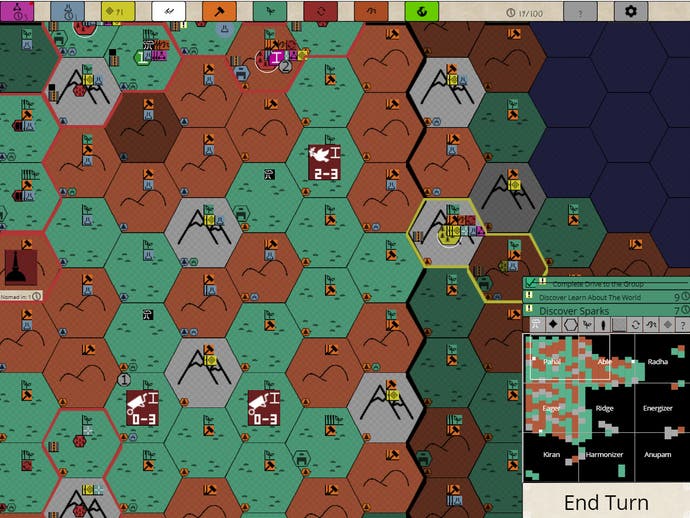Can you make an anti-imperial empire game?
The 4Xperts behind Civilization, Syphilisation and Victoria 3 discuss eXperimental 4X design.
4X games may sound incredibly reductive on the surface. After all, this is the only genre of game whose name is also a decree about how you should play - eXplore, eXpand, eXploit, eXterminate. But as any fan will tell you, 4X games are actually bustling sandboxes that can be tackled in all kinds of ways. For some players, that could mean eschewing military action or research or trying to make do with a single settlement. For others, it could mean trying to rewrite the historical events depicted - whether out of mischief, or in an effort to challenge narratives about the past that loom large in present-day politics.
Some 4X games lean into this spirit of eXperimentation. Take Syphilisation from Indian developer Nikhil Murthy, a "post-colonial 4X" and intricate parody of Civilization, centring on colonial India during the time of the British Raj. The game includes familiar 4X concepts and systems, but attempts to reframe "human struggle as a common striving for a better world rather than a competition between ourselves", though whether this ideal comes to fruition is up to the player. Rather than a government or ruler, the game casts you as one member of a group of research students, who put together their own interpretations of figures like Gandhi and Churchill while moving units and building cities.
I'm fascinated by Syphilisation, and got chatting with Nikhil on Twitter earlier this year. In one of those magical opportunities, it turns out he's friends with Ryan Sumo, a prominent member of the Philippine gamedev scene and developer of cute-but-cutthroat election sim Political Animals, who is nowadays a business owner for Europa Universalis IV and Victoria 3 at grand strategy household Paradox Interactive. Ryan, it transpires, is friends with Firaxis veteran Jon Shafer, designer of Civilization IV: Warlords and Beyond The Sword, and lead designer of Civilization V. We all got together one very nerdy Friday afternoon to discuss uninvestigated possibilities in collaboration systems and map design, and how this most imperial of genres can shapeshift in the hands of players and developers from former colonies. The below is a transcript of that conversation, edited for length and clarity.
Edwin: Perhaps we could start by talking about the inspiration and concept for Syphilisation, Nikhil, and how it's evolved over time?
Nikhil Murthy: So I started this game because I was reading Ulysses by James Joyce, and there's a moment in an Irish pub, where they're discussing the British Empire, and he had the pun "syphilisation" for British civilization. And at the time, I was also kind of thinking about parody in games, and it just clicked. With other mediums, we have a rich history of parody, we take the structures we find and we subvert them to make other things. Gulliver's travel is a subversion of adventure stories, right? And parody doesn't have to just be humorous. So I was thinking like, what if I make a game that criticises another game and its genre through the mechanics, rather than writing an essay saying these are the flaws, or whatever. And I was thinking about that as I read this pun, and it just clicked. Yes, I can make a post-colonial 4X game - of course, 4X games have a lot of colonial ideology just kind of baked in.
So we'll start with the two major pillars of 4X games that I think really hold a lot of ideology. The first is the idea of one winner, that you'll end your 4X game and one nation has emerged pre-eminent over all the others, right? Either they dominated the world, or went to space, or whatever. The second is growth for the sake of growth, which is really baked into 4X games. And in the current moment, that really feels like it's running up against reality, because we're seeing climate catastrophe. We're seeing the limits of growth for the sake of growth, in the world around us. It's just we don't see it in the games that act as translations of the world. So those are two really foundational points where a little pushback can be interesting, right? It just expands the space of the genre.
Ryan Sumo: The idea in 4X games of growth for the sake of growth - I hesitate to say it's 'natural', but it's so appealing, I guess, in a way that's difficult to replicate. How do you subvert or replace that?
Nikhil: I think from a game design perspective, the way to start is that, yes, people want to grow in 4X games. But that doesn't mean we have to just give it to them, right? In the same way that people want to win every war they get into, but if we just let them win wars where they're 1-to-20, the war system is no fun. Because there's no challenge, and it feels so disconnected. There's no push and pull, but not just that - a lot of what we're doing when we're playing is inhabiting the space, and it feels like the space is purely fantastical if you're just winning every war you walk into.
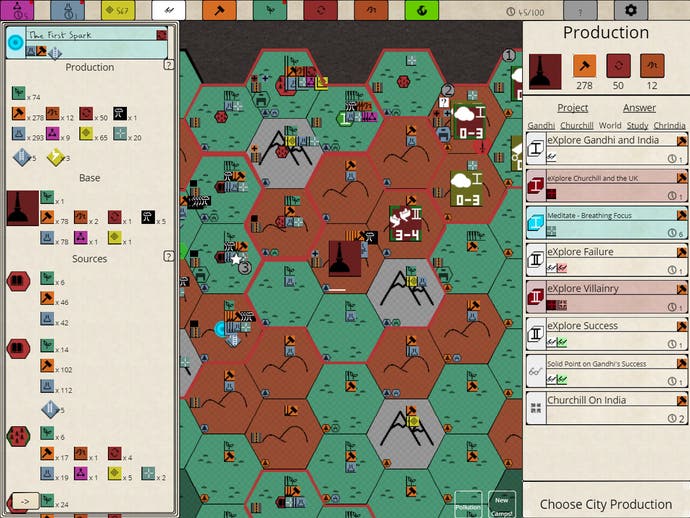
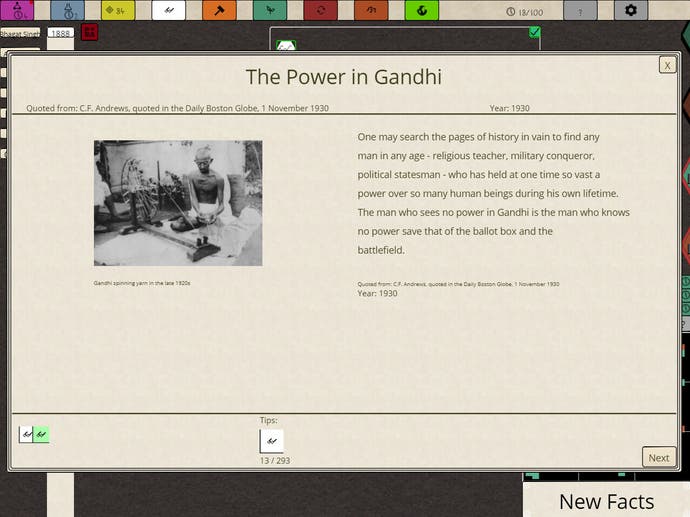
And when we build growth mechanics in 4X games and grand strategy games, it's a lot of 'you pay the cost, you get the benefit', that's the push and pull. There's a lot of space there for more of a back and forth. To put specifics on it, in my game there's a pollution system. And that's one you can interact with in a number of ways. So given that my game is [presented as] a research group report, I have pollution be a metaphor for people getting fed up with everybody else in the group. So there's a lot of back and forth that you can do as you get closer to others in the group, you get healthier about your own work ethics, and you're polluting less. I feel that there is a lot of space there for complicating it, rather than just saying 'you build a building, your production goes up', you know?
Jon Shafer: Is the player's goal different from the traditional 4X, where you have one winner?
Nikhil: You're doing a group report, and in group reports you have a goal and supposedly, it's cooperative, but when you do a group report there's some amount of disagreement, there's some amount of conflict. But the other thing I feel is that if you take a game like Civilization, with the space victories, where you put a person on Alpha Centauri or whatever - that doesn't have to be competitive. You know, that can be a collaborative endeavour. Culture can be collaborative, for that matter - there's no reason to frame all these things as having one winner.
That's what I'm doing - in my game there's one major goal of doing a good group report, getting as many points as you can. But a lot of the game is also just being friends with the other people. You know, those are explicit goals, learn about the other people in the group, become friends with them. It positions you as one of four students who really haven't interacted that much. This, to me, is "natural". If you're doing a group report with other people, that's a way to get to know them.
But I feel like with a game like Civilization, in particular, it's got a history that is in part inflected by boardgames, and it's natural, if you're going along the trajectory, to think of it as winner-takes-all. It's also natural to think about the space race as the US versus Soviet Union. One must win, right? But if the idea is to get a person to Alpha Centauri, I don't want my country sabotaging other countries that are trying to get there. That's not what I want as an individual. I feel like there's a lot of space in games to just say, we don't have to do things the way we've been doing them.
Jon: One thing I've really noticed, particularly with Civilization, but also Paradox games and really, strategy games generally, especially more single player-focused ones, is that a huge part of the audience that plays these games, they're looking more for a story. They're looking for an interesting way to interact with the world, to kind of define what that world will become, rather than it being purely competitive.

I think something you talked about Edwin was like, enjoying that first X-and-a-half, the exploration part and the initial expansion part, before you're really in competition. And that's something that I've heard over and over again, from players - this is the fun part, this is what people are into. And yeah, you know, Nikhil, you talked about how it has this background in board games, which tend to be quite competitive. So yeah, there's this friction there between those two different things that the game is doing.
I think anytime you have a game or a game series that's as successful as Civilization, you're always going to have multiple audiences that are looking for different things. But something that always really stood out to me was just how interested people were in the story side of things. And this is something I think we didn't really think about much, as designers early on, but it became more obvious with the internet and with forums, that this is something that people really love. So I think you're right, there is definitely a lot of space there to continue to explore.
Nikhil - what would you say has most influenced Syphilisation besides Civ? Where have you pulled ideas from?
Nikhil: There's a book by McKenzie Wark called Gamer Theory, where she talks about a number of different games, and one of the things I got from there, one of the things she alludes to, is that a true postcolonial 4X game would not have the same conception of land that current 4X games have, right - those very map-heavy projections of power. I think if you were to truly make a post-colonial game, it would have a much more fluid conception of land. But what I felt is that with this game, I don't want to alienate players right from the get-go. Because it's already probably too much for a lot of players. I wanted to keep close to the base of Civilization wherever possible, to make the parody function, otherwise it just becomes noise, you know? But yeah, I stole a lot from a lot of places. I stole from Old World, I stole from Humankind.
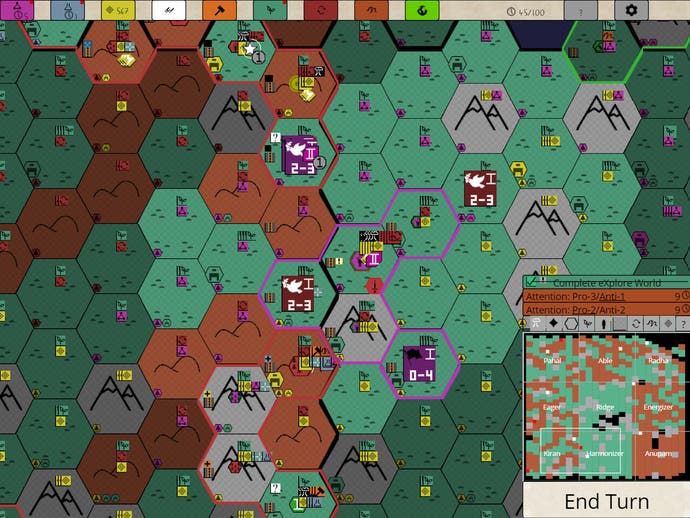
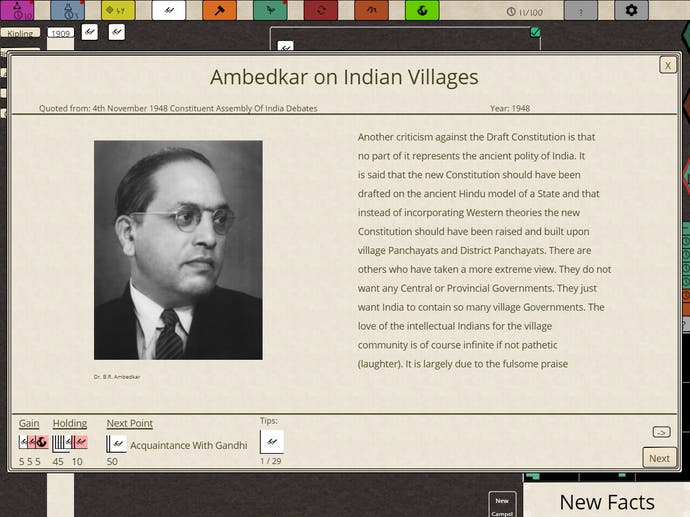
Jon: What do you think about the tension between trying to explore new space and speak to new ideas versus fun? Because something I'm often asked about Civilization is whether Civilization is an educational game. And the answer is that it's not, it's a game and fun has always been the primary goal. And the fact that it ties in with history is important. It's part of providing that story for players. But ultimately, like, the goal is you want to make the game as fun as possible. So how are you thinking about that tension?
Nikhil: I feel like there are a lot of ways to define it. You see a lot of players who are very particular about whether they're playing scifi 4X or fantasy 4X or historical 4X. I mean, it's largely the same mechanics, largely the same underlying numbers, but the experience is very different. Because it just feels different if you're shooting mindworms or whatever, right?
With this game, I think the fun is in saying, 'I see what he's doing with this game, here are all of the things he hasn't thought about'. Here's all of the space left in this genre that he's just not thinking about. If this is a postcolonial 4X game, this is what a postcolonial Breath of the Wild would be, this is what a, I don't know, postcolonial Roller Coaster Tycoon would be. I think that can be fun for players. I mean, we all know that players love backseat design!
Edwin: Regarding Nikhil's point about collaborating with other players or the AI - I feel like Paradox is very good at pursuing interpersonal dynamics and ways of collaborating that kind of get beyond the classic, 'here's one nation, here's another nation, here's a diplomacy system lets them talk to each other' approach. Ryan, do you have any thoughts to share on that front?
Ryan: I mean, I think we still share that weakness. I don't think that any game has really cracked that. One thing that I've always been interested in like, for example, when it comes to politics, there's a term we call horse trading, right? You give something, I get something in return. But I don't think I've ever seen a game that's done that in a way that feels very organic, or fun to me. And I don't think any of our games have done that very well, or any Civilization games. So that's, I think, a code that's yet to be cracked.
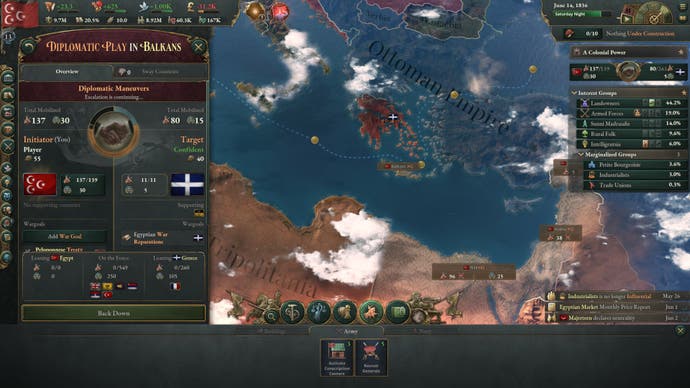
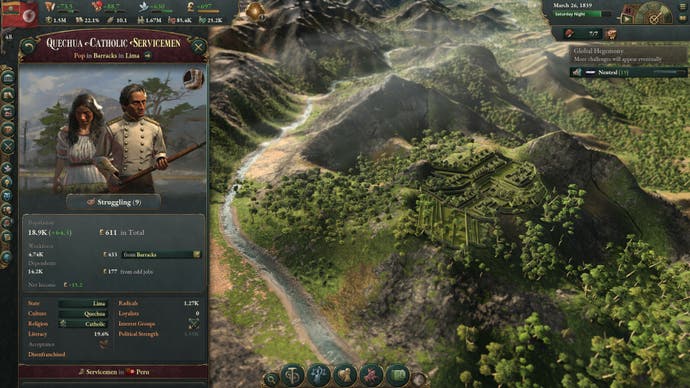
In some cases, we get around that because we do have the multiplayer aspect for Paradox games. And one of the most interesting things that we do is this thing called the Grandest LAN - every year, since a couple of years ago, we've held this event with a Polish company, where it's basically a big LARP, and people go to a castle for a weekend and play a grand campaign with a bunch of other people. And they're actors, and they act out diplomacy with each other, and it's kind of the ultimate way to experience the game. But the funny thing is you need actual, real people there to have that experience.
Jon: This is a really interesting topic. And it's something I've been thinking about more lately. So many games, including strategy games, are about competition and conflict. And it's obvious why those things are fun. I mean, games like chess go back hundreds, thousands of years and are really enjoyed by a lot of people. But when you think about especially grand strategy games, that encompass so much of history and society and try to simulate as much as possible - when you look at the historical record, when everybody was fighting each other all the time, in the mediaeval age, or in earlier eras, we were all much poorer, disease was more common. And we didn't have, you know, stable food supplies.
And as we learned as people to cooperate more, that ended up helping people in really enormous ways. And despite the problems that we have in modern society now, it's the fact that we can cooperate and build big organisations and trade at a global scale that's allowed us to enjoy better lives and longer lives and healthier lives. And I find it really interesting that it is such a difficult challenge to capture that in the game. And the only thing I can think of there is that it is a question of design in a lot of ways. This is a space that can be explored, if you put in the effort to crack the code.
Ryan: Right, because, now you say this out loud, I start to think that yeah, cooperation works best for all of us but as humans, we don't really feel that. Even as human beings outside of a game, there's no points system in humanity that says when we cooperate, we do better. When we intellectualise it, we think it out, we kind of understand it. But internally, we don't always come to the conclusion that when we work together, this is the result.
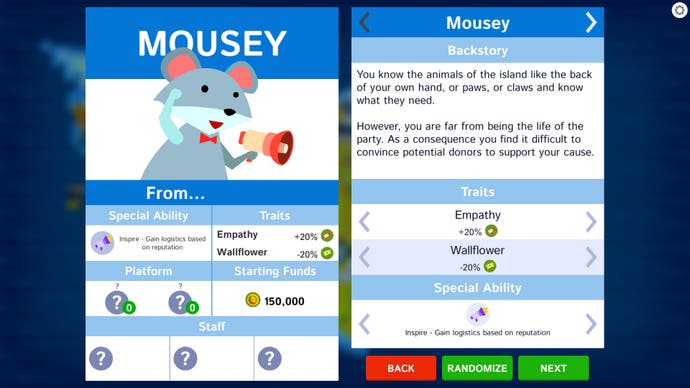
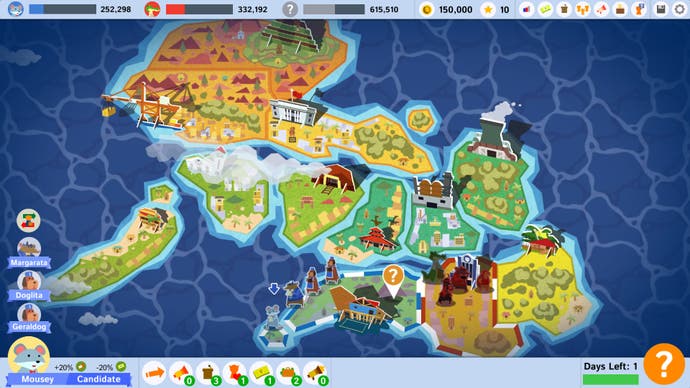
Nikhil: That's why it's such a fertile gamespace - there's always this tension of, 'I know I should cooperate, but I want what I want'. This is what you want from a design space, right? You don't want the pat answer: 'yes, I must always cooperate all the time'. You want the interesting decisions that come from, 'I should cooperate, but I'm gonna be selfish this one time, or I really want this, but I will put it aside, because I think somebody else will do better for it'.
Jon: How much are you trying to dig into that with Syphilisation?
Nikhil: The weird thing is that's what I thought would be the toughest nut to crack. And that's the one that came together for me, just like that. The place where I see it the most is just in [saving labour]. Like, you want to build the city, you have to conquer this, you have to conquer the other city... In this game, I'm just like, you know what, I'll let this other person take that city, because then they'll manage it, it will be more productive for the group, and I don't have to deal with it every turn, I don't have to manage it myself. Let somebody else do some of the work on his report, right?
And this makes sense, because if you look at Civilization, a lot of people do this. It is often strictly better to conquer your neighbour, because it's such a productivity boost, but people don't want to do it, because they know that it becomes a lot of hassle. You've got to deal with all of their cities, they have all these tiny cities that aren't producing enough, you know.
Edwin: One thing I really like about the factions in Amplitude's Endless Legend is that they're all sort of experimental 4X playstyles. Some can't declare war, some can't have cities, or they have completely different ways of gathering resources. That strikes me as a game that is trying to sate some of the unaddressed player needs you've identified.
Ryan: In some cases, maybe despite themselves, Paradox games are exploring that space. Like for example, with Crusader Kings, it's one of Paradox's most popular games, and a lot of people play it for the roleplaying aspect. It's not so much about expanding your nation. It's about, who can I marry off my kids to, and this story about their family and their dynasty. I can't say if that was intentional from the start, but I can say that, for sure, it's something that we've noticed, and are leaning into a little bit more now, than we probably would have 10 years ago, when we were making CK2.
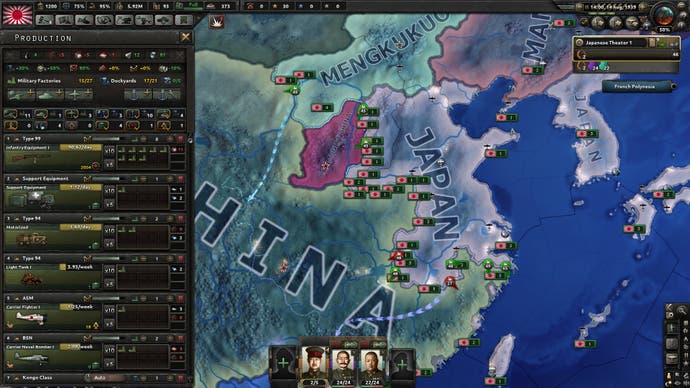
Right now, each game is trying to sort of find its own personality in that space. So a very cool example is Hearts of Iron. And so it's a World War II game. And that's just a wargame through and through, it's about moving your units around. It's about logistics and all of these things. And CK3 is starting to become more of a roleplaying kind of a game. Victoria 3 is trying to find its way as an economic simulator, and it's succeeded in some ways. And so yeah, there are things that even more traditional 4X or grand strategy games, I think, are exploring, within the limited space of a very mainstream company, which has to meet certain profit margins - even we are trying to explore different ways of playing the genre.
Jon: Edwin, you mentioned Endless Legend, and I think to compare that to Civ - in Civ, there are expectations for what a game about history should be. And if you start changing the script a lot, then you're not really delivering on that, in the same way. Whereas in a fantasy game, or a science fiction game, as a designer, you can go wild with the rules, especially from the base Civilization formula. You can push that in certain directions, but making it so that, say, only certain civilizations can declare war, for what Civilization is trying to do, it doesn't really make sense.
It definitely feels like on the historical side, there's a lot of potential to explore human relationships and politics and the tensions between people trying to compete and cooperate, how that plays out. If you're trying to stick to a more traditional formula, being a little bit more interesting in your setting or your themes, can kind of open up the space there. It's interesting with a historical game, you get a lot 'for free' in a way, but also the expectations for what you're going to do are more specific.
Nikhil: I'm actually gonna push back a little bit there. When I started making Syphilisation, I made it a group report instead of having you actually decolonize India, putting you into the game as the Indian National Congress or something. Because all of our history games are like alternate history games, right? It's not like there's a 6000 year old Gandhi, watching over you from 4000 BC, choosing everything the country does [as in Civilization]. The reason I didn't implement it as decolonizing India directly is that then there's a possibility space I didn't feel qualified to implement. I don't have an answer to the question of what if the Indian independence movement was more violent? What if Jinnah had taken over the ANC leadership in the 1920s? I just don't have answers for this.
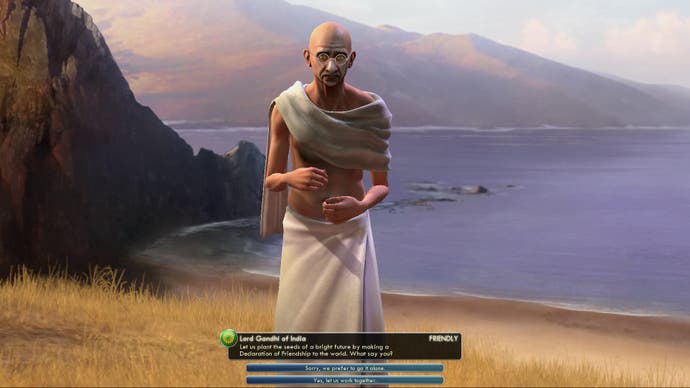
I think with historical games, what players get a lot of enjoyment from is not when the systems do things that mirror reality, but when the systems do things that mirror the reality they expect, right? I read Guns, Germs and Steel by Jared Diamond a while ago. And the core of that is that it's countries with better guns, better germs and better steel that win. But then I look at the history of Mysore state, where I'm from - Mysore had better steel than the British Raj. They had better guns than the British Raj, and they had better germs than the British Raj. There was unquestionably more disease in Mysore state! And yet they lost, and it wasn't close - they lost quite badly in the four Anglo-Mysore wars, and Mysore ended up becoming part of the Raj as a whole. Different perspectives will give you different things, but the current set of historical games have a very specific ideology that they reproduce.
Jon: Yeah, I think that's totally fair. I think when making a historical game, the challenge is great in the sense that you can kind of zoom in and zoom out. And that allows you to take advantage of different mechanics and to explore new ideas. And part of it maybe is just that when you're dealing with a really big series that's been around for a long time, that's where expectations really become very important, in terms of what you think about as a designer, and starting something new gives you a lot of freedom to redefine that, whereas if you tried to make the actual Civilization series, anti-colonial or anti-imperialist, I think that would be a really big challenge. I think it would be really hard to figure out what to do there. But you're able to come at it from a completely different angle and say, no, we're going to look at a different kind of history, a different way of thinking about the situation. You have a lot of freedom to explore things in a new and interesting way.
Nikhil: Yeah, I mean it's easier for me, because I don't have sales targets or anything. But a common criticism of Civilization is that you can be anyone you want to be, as long as it's America. People enjoy historical games because they present the familiar in unexpected ways - the system shows you things that you expected the result of, but you didn't really expect how it got you there. So when the system comes out with something that you expected to see, that's fun, but it means that if you're making a game like this, for a large audience, it must [eventually] reproduce the status quo. Like yes, you're making Civilization, so you do have to end up being America. That's just the nature of the material conditions of making a game like Civilization, right?
Ryan: I think as you said, Jon, it's kind of pop culture in a way. The larger your audience is - I don't want to say you have to go to the lowest common denominator, but there are risks you can't take. For example, to roll back a little bit, I remember when Victoria 3 first came out, during the first few months, there was an issue with the American Civil War. The event wasn't firing, it wasn't happening, and it was very upsetting to a lot of players. Why isn't this happening? Obviously, this has to happen and subsequently the AI was fixed so that it would happen at roughly the time that you'd expect. So just kind of reinforcing what Jon was saying earlier, player expectations do limit you a lot.

But it depends on who you are. When I was playing Victoria 3, I was playing the Philippines, obviously, and all I cared about was how the Philippines looked. It's a puppet state of Spain and like, I couldn't give two shits if there was a civil war in the US. What I cared about was, how do we free ourselves from the Spanish yoke? And I did it. And it was a bit too easy. I won basically by allying with the Austro-Hungarian empire, they got involved in some way, and the war was mostly fought in Europe. And we didn't do anything, but we won our independence. And at the end of it, I would say it's not satisfying! I wanted to bleed for my independence. I didn't want it to happen this way.
Nikhil: It is true, though, that when people play a Paradox game, they expect canonical events, right? The invasion of England by the Normans, or the American Civil War and World War 1 or whatever. These are big picture history things. But while I don't think any of us would really plant our flag as educational games, people do enjoy learning history from these games. I think there's just a lot of world history that you won't pick up in class, because world history is big. Now, you can't do everything - you can spend your whole life doing history, and how much of it can you ever really get? Still, I do think there's space there for canonical events that are in less well-known, less represented regions.
Edwin: Nikhil, you talked about the idea that if you want to make a postcolonial 4X game you need a completely different approach to space. And that made me think, Jon, about swapping square tiles for hexagonal tiles in Civilization V. I couldn't quite say how that affected my approach, but it makes me wonder whether there are fundamental ideas about space in a 4X game that you can change, without throwing off returning players?
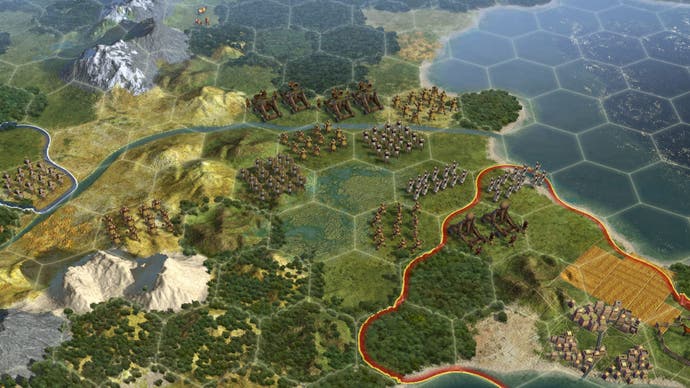
Jon: Yeah, the map is a really fundamental element of these games. And that kind of goes back to them starting as board games, and growing from that place into something much bigger. So I recently went back and played Civilization 1 again. And it's remarkable how simple it is compared to the more recent games, it's really quite amazing, when you actually go back and take a look. And, yeah, that DNA is still so fundamental to what's in Civilization. But it's something I've thought a little bit about - how could you make a 4X game that isn't just that same physical space?
And I think there's so many ways you could do it, but it would be more challenging because nobody's done it before. So you could have corporations fighting over nodes or technologies - this is something where you could still have the same concept of growth, where you start from this little seed and you're growing, but you're not growing across a geographical map, you could be growing across economic or political space, or acquiring allies with characters built into networks. There's a lot of potential there. It would be a completely different way of looking at the genre, but I think something like that could work, absolutely. Part of the fun of games and game design is that it is an art form and there is infinite potential there. So it's something that I really hope that we see more people exploring. I think what Nikhil is doing is really exciting.
Ryan: We were talking earlier about cooperation. And it got me thinking a little bit, because I'm sort of in the Victoria 3 mindspace about it, where there's cooperation but it's still competition. But I was thinking about Pan-Asianism and how it fits into that timeframe. It was a bunch of Asian intellectuals that were trying to build this narrative, or - not really like an alliance or anything like that, but just how do we, as Asia, define ourselves, or come together to confront the West in Europe? And that's something that could be explored in terms of the spirit of cooperation, but then it's still kind of in opposition to something else.
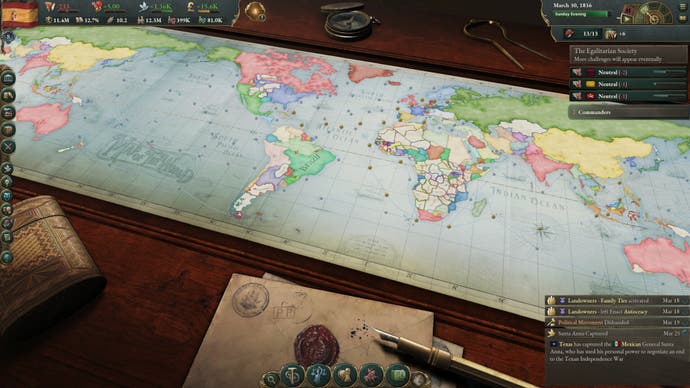
Nikhil: I guess the way it works out is like, even, say, coming together on the space programme or on a group report like in my game, that's oppositional in nature. There is something that you are in conflict with, even if it's not other players, even if it's something you're striving towards, and that inherently holds some conflict. It's interesting, as you say, with Pan-Asianism because so many Indian intellectuals look to Japan, and their position is if they can do it, why not us? And the way I look at the Indian independence movement is that it actually wasn't a struggle against the British as much as a struggle to form a national identity.
When you look at the Jallianwala Bagh massacre in 1919, you had General Dyer come with his troops, and there was a peaceful gathering in Jallianwala Bagh, which was a walled park, and they closed off all the exits and opened fire. Estimates of how many died, of course, vary greatly depending on who gets to do them. It was a major turning point for the Indian independence movement, because that is when people gave up on the idea of working together with the British to achieve independence. People saw countries like Canada and Australia move towards independence in a very separate way than what happened for non-white countries.
But the brigade that did it were not white troops. One of the soldiers, when asked about it, said he was happy to come and shoot the plains people, because he came from the hills. He viewed the people he shot as an entirely separate group of people. And that was in 1919-1920, but then in 1947, all of India has one idea of who they are. Present-day India - partition happened, and partition is a big deal, but that establishment of national identity was key to the Indian independence movement. Who are we and what are we fighting for?
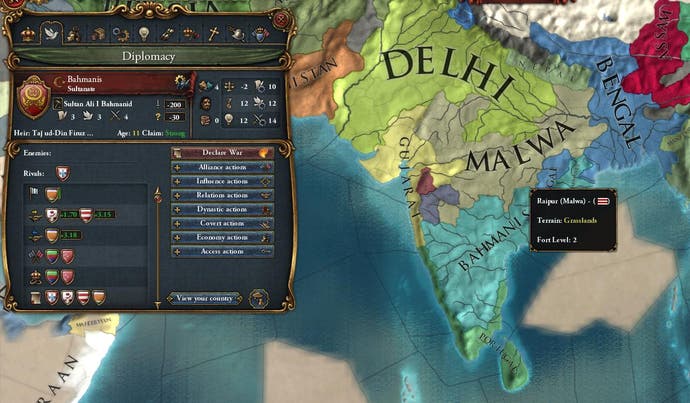
Ryan: I mean, it's not that much different from the Philippines, and how our whole nation defines itself in opposition to another country, and then you build a national mythology around that, but there's an in-group that builds that mythology, and there are people left behind. And those are things we're still dealing with.
Nikhil: Everyone's always negotiating - like, not all of India speaks Hindi. It's the same in the Philippines, right? There are people who have a different language, a different culture. That's something that's really hard to represent. With Victoria 3, I played Sweden in my last game, and you set up colonies in Africa. And the game tells me you have 100,000 unemployed people, and I look at where they are, and they're in the African colonies! And I can assure you that had Sweden set up this colony, they wouldn't be worried about unemployed people in Cameroon. That's not how the relationship worked. But it is very tempting with such games to just abstract everybody into the same person, right?
Ryan: I don't think it's tempting, it's just like, the laws of physics. You can't really break down every individual in the simulation. There's a lot of marketing speak, sometimes - oh, every individual's a unique [entity] in the game. Come on! We have to abstract it because there's no other way around.
Nikhil: But what we can do is generate spaces for players to at least engage with the idea of individuals, right? We tell stories of individual people inside your large empire, and how these two guys are both, I don't know, labourers and work on this one railway, but they have very different beliefs. Because I think we get too caught up in the idea of a simulation. Every simulation is going to be deeply imperfect, just by default, and yet it feels like we always strive to make the simulation more accurate, instead of saying 'this is what the simulation says, and I stand by what I'm getting it to say.'
Edwin: Jon, Nikhil, Ryan - thank you so much for your time.
